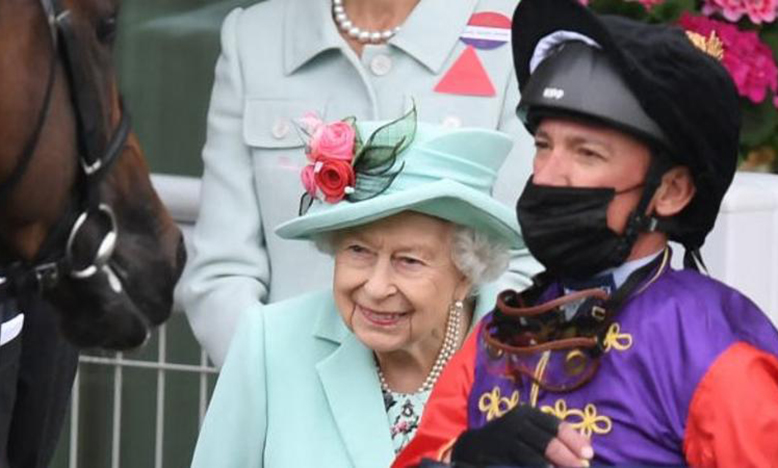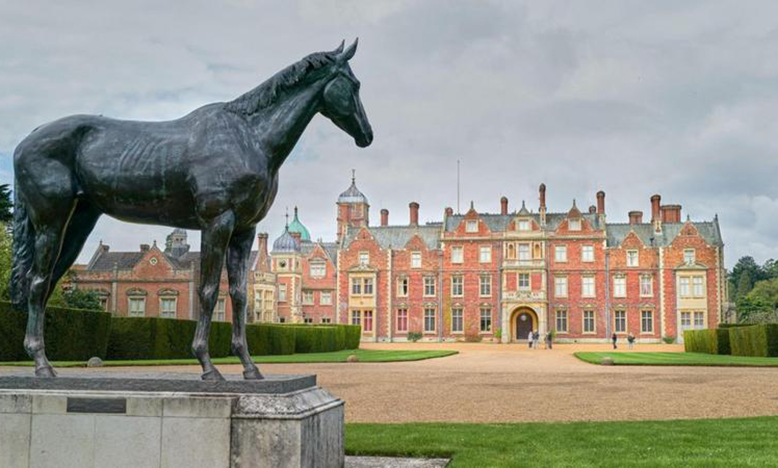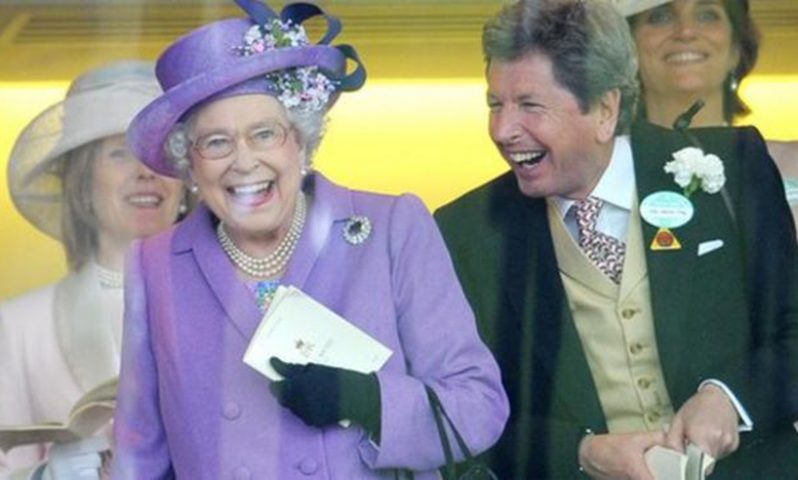By Frank Keogh
BBC Sport
THE first thing you notice when arriving at the Queen’s holiday home is a life-size sculpture of her racehorse Estimate.
The statue at Sandringham is testament to her enduring love of horse-racing, a sport which offered a rare glimpse into the person behind the crown.
When Estimate won the Gold Cup at Royal Ascot in 2013, it was the first time in 207 years that a reigning monarch had owned the winner. She was caught on camera beaming with delight from the Royal Box, alongside her racing manager John Warren.

“When it ends up with a result like that, it is effectively the end of an amazing journey,” he said.
Estimate’s triumph was among a total of more than 1 800 victories in her jockey’s racing colours of purple, gold and scarlet. And the Queen was recognised for her contribution to racing as an owner and breeder by being inducted into the British Champions Series Hall of Fame in 2021.
Racing gave the Queen a diversion from the more sober business of global and domestic affairs.
“She used to say to me: ‘It’s nice to come to a place that doesn’t smell of fresh paint’,” said trainer Richard Hannon. A copy of the Racing Post newspaper was always tucked in with her daily correspondence.
Horses were a feature of her life from early childhood. The Queen learned to ride on a Shetland Pony called Peggy, a fourth-birthday present from her grandfather George V.
Her interest in racing developed during World War Two, when she accompanied her father to see the royal horses training in Wiltshire. “I was able to pat them in the stables afterwards,” she later recalled. “I’d never felt the satin softness of a thoroughbred before.”

The Queen’s first public appearance at a race meeting came a fortnight after the end of the war in Europe, in May 1945, when she first accompanied her parents to Ascot.
The Royal Ascot meeting was to become one of her favourite social occasions, and she enjoyed a total of 24 victories. Every year, the Queen would arrive in a procession down the track from Windsor Castle and punters would bet on what colour hat she would wear – with blue proving a popular choice.
It was from her father, King George VI, that Queen Elizabeth II inherited the Royal Stud, from a racehorse breeding centre at Sandringham which has produced many of her winners.
Her first victory came with Monaveen over jumps at Fontwell Park in 1949, and she was twice champion flat racing owner in Great Britain – in 1954 and 1957.
“She recognised her horses by sight, was fascinated by their mental and physical development and always talked in detail to the groom who looks after each one,” said broadcaster Clare Balding, whose grandfather, father and brother have all trained horses for the Queen.
“One tiny example of the attention to detail was the Queen never wore perfume when she visited the yard to see her horses as it can excite testosterone-fuelled young colts,” she said.
“The Queen was a keen follower of the horse-whisperer, Monty Roberts, and adopted many of his techniques on her foals and yearlings – for instance, leading them over a blue plastic sheet so they are not afraid of walking through water.
“The result was that they were more responsive and better behaved when they arrived at their various racing yards.”
She would name the horses, often with a clear message – such as Duty Bound, Constitution and Discretion.
A keen rider herself, the Queen demonstrated her prowess in the saddle when settling her mount after being shot at by a gunman during the Trooping of the Colour parade in 1981
The Queen carried on riding horses into her 90s.
Trainer Sir Michael Stoute, who oversaw more than 100 royal winners including Estimate, said she was a pleasure to work for.
“I found that training for the Queen came with no pressure, because of her understanding, her deep knowledge and her thirst for more,” he said.
“She was always thinking ahead – what am I going to do with this animal, am I going to breed it, who should I breed it to – temperament, speed, stamina. She was fascinated with the whole idea.”
One of her favourite jockeys was Frankie Dettori, and the pair would often share a joke after big-race wins, as Dettori recalled after a victory in the King George VI and Queen Elizabeth Stakes at Ascot.
“‘That’s my fourth King George,’ I said. The Queen looked at me and raised an eyebrow: ‘Lester (Piggott) won seven.’ That was me told,” he said
As an owner, the Queen won four of the five British Classic races.
Dunfermline claimed the Oaks in 1977 three days before her Silver Jubilee celebrations and also won the St Leger after earlier successes with Carrozza (Oaks 1957), Pall Mall (2,000 Guineas 1958) and Highclere (1,000 Guineas 1974).
The biggest prize of all, the Derby, eluded her, coming closest in her Coronation year of 1953 when Aureole was second to Pinza as newly-knighted jockey Sir Gordon Richards finally landed the Epsom race at his 26th try.
Another near-miss came in 2012 when Carlton House was third.
Estimate’s triumph at Ascot 12 months later yielded more than £150 000 in prize money and the Queen will have earned millions overall down the years, although much of that offset by training fees and other costs, and the winnings seemed secondary to the fascination of taking part.
Warren said horses were a “tremendous getaway” from other duties and her support had been a major boost for British racing.
“I’m sure if the Queen had not been bred into being a monarch she would have found a vocation with horses. It was just simply in her DNA,” he said



.jpg)








